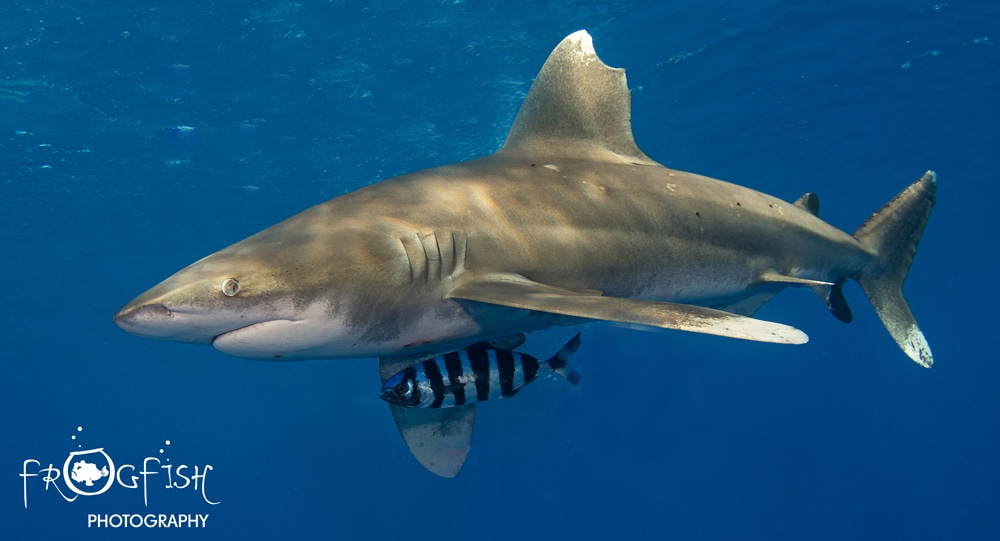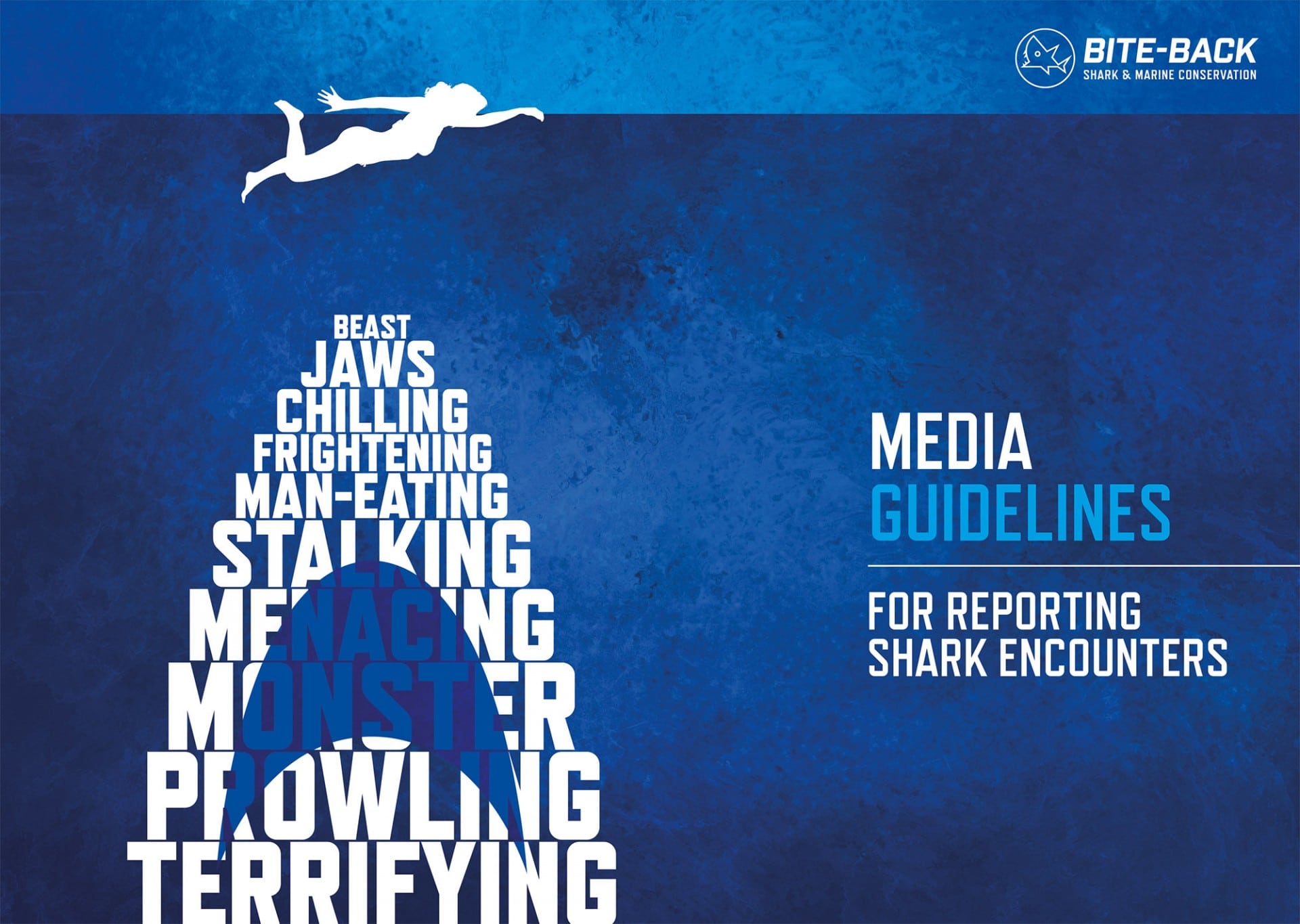News
Mind your Language: TV Presenters back Bite-Back’s call for responsible shark journalism

TV presenters Steve Backshall and Hugh Fearnley-Whittingstall head a growing list of high profile individuals supporting a call for responsible shark journalism by Bite-Back Shark & Marine Conservation.
The UK charity says that decades of news headlines labelling sharks as ‘monsters’, ‘killers’ and ‘beasts’ — language typically used to describe rapists, terrorists and paedophiles — has created a climate of fear and loathing that is thwarting shark conservation initiatives.
Bite-Back’s view is underpinned by a recent survey that revealed 46% of Brits think that sharks are terrifying than spiders, snakes and rodents combined and that 64% would prefer them not to exist.
TV presenter and patron of Bite-Back Shark & Marine Conservation, Steve Backshall, said: “It’s time that journalists understand how these sensational headlines and falsehoods are perpetrating a hatred of sharks that justifies their boundless slaughter. As such, I think the media is complicit in one of the greatest deliberate exterminations in our planet’s history.”

An estimated 73 million sharks are slaughtered every year and Britain ranks in the top 25 shark fishing nations in the world. As a result, populations of key shark species including the great white, hammerhead, oceanic whitetip and thresher have fallen by 90% in the past 60 years.
Chef and campaigner Hugh Fearnley-Whittingstall said: “Sharks are getting a bad press they simply don’t deserve. Decades of sensational headlines have stripped sharks of their status as vital marine species and all too often left the public frightened for little reason. I’d welcome any move by the media to fairly report sharks rather than default to tired and inaccurate click bait captions.”
In the past six weeks most UK print, online and broadcast media outlets have run shark stories from around the world and closer to home. Many have used language including ‘ferocious’, ‘terrifying’, ‘killer’, ‘invasion’, ‘blood-thirsty’, ‘lurking’ and ‘deadly’ to describe sharks despite the fact that typically only six people a year worldwide die from shark encounters, whereas dogs kill around 25,000. On average British cows kills more people each year than all the sharks in the world.
Bite-Back has also achieved support for this appeal from ocean ambassador Wendy Benchley, widow of Peter Benchley the author of JAWS. She said: “While the cinema is a place of entertainment, newspapers and media channels are a place for facts. For far too long the news press have blurred the boundaries between fact and fiction and got away with reporting sharks as man-eating monsters when it’s simply not true. I believe this constant portrayal of sharks as the bad guys rather than our ocean heroes is hindering shark conservation efforts.”
In a bid to make Britain the first western country to ban shark product by 2022, Bite-Back has successfully campaigned for ASDA, Iceland Foods and MAKRO to end the sale of shark steaks. It has also spearheaded an 82% fall in the number of UK restaurants selling shark fin soup and prompted Holland & Barrett to end the sale of shark cartilage capsules.
 Campaign director for Bite-Back Shark & Marine Conservation, Graham Buckingham, says: “No other creature on this planet is described with inflammatory language intended to spread fear, panic and hate. As a result, the mere presence of a shark in the sea prompts sensational, attention-grabbing headlines. We’re keen to work with the press and reach a point where shark encounters are reported accurately and fairly and in a way that doesn’t jeopardise our blue planet.”
Campaign director for Bite-Back Shark & Marine Conservation, Graham Buckingham, says: “No other creature on this planet is described with inflammatory language intended to spread fear, panic and hate. As a result, the mere presence of a shark in the sea prompts sensational, attention-grabbing headlines. We’re keen to work with the press and reach a point where shark encounters are reported accurately and fairly and in a way that doesn’t jeopardise our blue planet.”
The charity now plans to present its 15 page media guideline document on best practice for reporting shark encounters to all the major news channels in the UK.
Read more about shark conservation issues visit www.bite-back.com
Gear News
Introducing the TR-80, IR-50 and CS-30 Regulators from DYNAMICNORD

Whether you are a beginner or a professional diver – with the three new main regulators from DYNAMICNORD, everyone will find their favourite regulator. They all look super stylish.
Excellent performance with the TR-80
Quality and performance are the be-all and end-all for regulators. It is not for nothing that the TR stands for Tec Reg. The innovative design of the TR-80 guarantees absolute reliability – even in ice-cold waters.

Perfect breathing effort at 0.8 J/l / certified for diving in waters below 10 degrees / structural design made of solid brass for best cold protection / membrane-compensated design with dry seal of the first stage / reduced exhalation effort thanks to optimized exhalation membrane and bubble deflector / adjustable Venturi (dive/predive) and adjustment knob for individual inhalation comfort / innovative design of the front cover prevents free-flow in strong currents or when diving with scooters / design made of sandblasted brass, matt chrome finish / 2 HP and 4 LP outlets / mouthpiece made of high-quality, anti-allergic silicone for maximum comfort.


Amazing underwater adventures with the IR-50
The IR-50 is the top regulator for advanced and experienced divers. Natural breathing is the essence of this regulator.

Ideal breathing effort at 0.8 J/l /certified for diving in waters below 10 degrees / compensated membrane / adjustable venturi (dive/predive) and adjustment knob for individual inhalation comfort/ outlet valve and deflector for minimum exhalation effort and reduction of bubbles on the face / design made of sandblasted brass, matt chrome finish / 2 HP and 4 NP outlets / mouthpiece made of high-quality, anti-allergic silicone for maximum comfort.


The Workhorse – our CS-30
For diving centres and diving beginners – the workhorse stands for strong construction, reliability and robustness. Perfect for your training.

Optimal breathing effort at 0.8 J/l /recommended for diving in waters above 10 degrees / non-compensated piston / adjustable venturi (dive/predive) / outlet valve and deflector for minimum exhalation effort and reduction of bubbles on the face / design made of sandblasted brass, matt chrome finish / 1 HP and 3 NP outlets / mouthpiece made of high-quality, anti-allergic silicone for maximum comfort.


Octopus OP-30
The OP-30 is the ideal addition to all DYNAMICNORD regulators. It is identical in construction to the CS-30.

The TR-80, IR-50, CS-30 (DIN & INT) regulators and the Octopus OP-30 are available from DYNAMICNORD dealers and in the online store.
DYNAMICNORD – Your Outdoor Companion.
Marine Life & Conservation
Paul Watson Released as Denmark Blocks Japan’s Extradition Bid

Renowned anti-whaling activist Paul Watson has been released from custody in Greenland after spending five months in detention. Denmark’s Justice Ministry rejected Japan’s request for his extradition, citing insufficient guarantees that his time already served in custody would be credited against any potential sentence.
The 74-year-old Canadian-American was arrested on July 21 in Nuuk, Greenland’s capital, when his ship docked to refuel. His arrest was based on a 2012 Japanese warrant related to a 2010 encounter in Antarctic waters. Japan alleged Watson obstructed operations and caused damage to a whaling research ship during efforts to disrupt illegal whaling. Watson has consistently denied these claims, maintaining his commitment to marine conservation.
Denmark, which oversees extradition matters for Greenland, concluded that while the legal conditions for extradition were met, the lack of assurances from Japan regarding time-served credit made extradition untenable.
In a video shared by his foundation, Watson expressed gratitude and relief, saying, “After five months, it’s good to be out… and good to know they’re not sending me to Japan.” He added that the most difficult part of his time in custody was being separated from his two young sons.
Watson is a pioneering figure in marine conservation, known for founding the Captain Paul Watson Foundation in 2022 after decades of activism with the Sea Shepherd Conservation Society. His bold efforts to defend marine life have earned him widespread support, including from celebrities and conservationists. His work has also been featured in the acclaimed reality TV series Whale Wars.
Watson’s lawyer, Jonas Christoffersen, praised the decision, stating, “We are happy and relieved that Paul Watson is now free.” He added that Watson is eager to reunite with his family and continue his vital work.
The arrest occurred while Watson’s vessel, the M/Y John Paul DeJoria, was en route to the North Pacific with a team of 26 volunteers to intercept a Japanese whaling ship. His foundation described the arrest as politically motivated and emphasized that Watson’s actions were focused on ending illegal whaling practices.
Japan resumed commercial whaling in 2019 after leaving the International Whaling Commission, asserting that whale meat is a cultural tradition. Conservationists, however, continue to challenge these practices, highlighting their impact on marine ecosystems.
Despite the challenges, Watson remains steadfast in his mission to protect marine life and bring attention to whaling practices. His dedication to ocean conservation has made him a globally respected advocate for the environment.
-

 News2 months ago
News2 months agoIconic SS United States to become the World’s Largest Artificial Reef
-

 News3 months ago
News3 months agoBook Review – 52 Assignments: Underwater Photography
-

 Gear News3 months ago
Gear News3 months agoDYNAMICNORD – New German diving brand enters the British market
-

 News3 months ago
News3 months agoExploring Cenote El Pit: A Diver’s Dream
-

 Gear News3 months ago
Gear News3 months agoTry BARE drysuits (and maybe even win one!) this Friday with Sea & Sea at North West Dive Fest
-

 Marine Life & Conservation3 months ago
Marine Life & Conservation3 months agoBook Review: Coral Triangle Cameos
-

 Blogs2 months ago
Blogs2 months agoDive the Egyptian Red Sea this Autumn with Regaldive
-

 News3 months ago
News3 months ago2024 Ocean Art Underwater Photo Competition Announced















